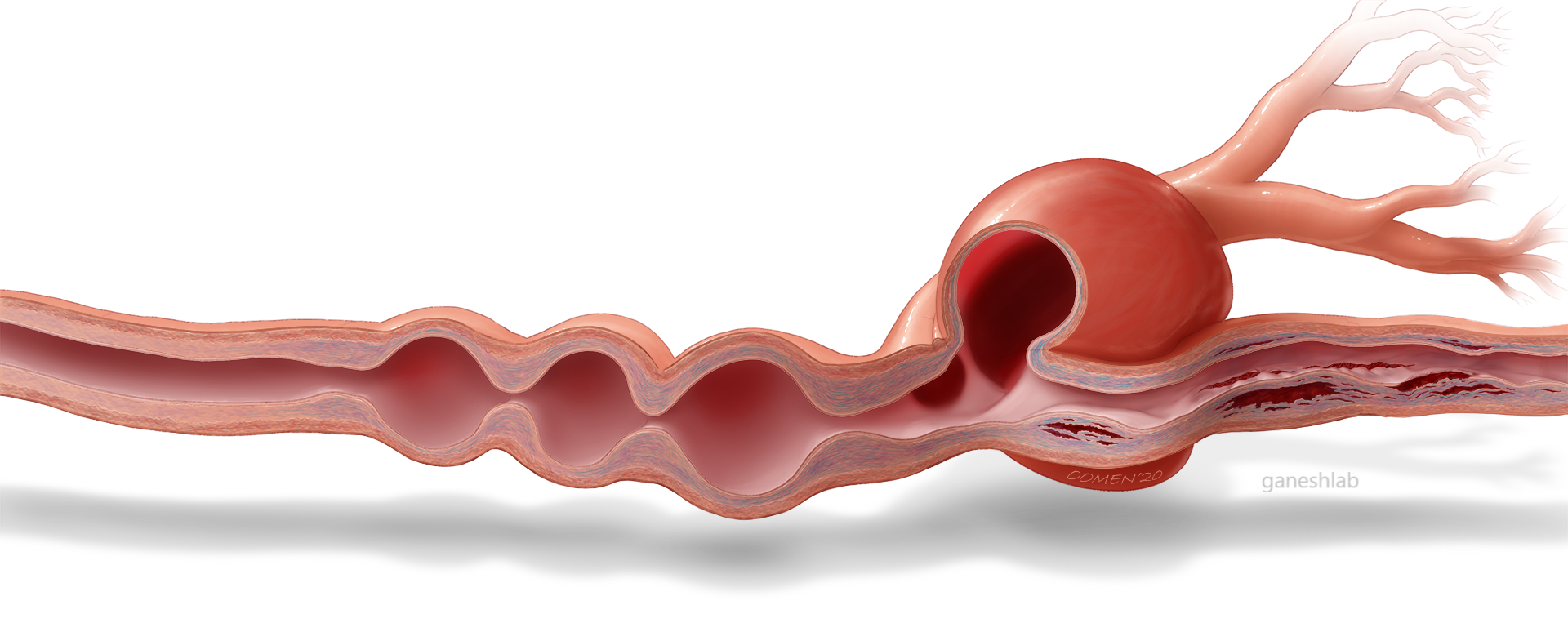
We study the genetics of vascular diseases, employing genomic methods and model systems to understand arterial diseases.
DYSPLASIA-ASSOCIATED ARTERIAL DISEASES
Fibromuscular dysplasia (FMD), spontaneous coronary artery dissection (SCAD), arterial aneurysms, and non-coronary arterial dissections are potential manifestations of a process of dysplasia in the arterial wall that leads to poor organization of the cells and extracellular matrix. Histopathologic alterations are most notable in the arterial media, although the intima (inner layer) and adventitia (outer layer) play roles in these diseases as well. We are conducting studies to discover genes and biological processes driving arterial dysplasia, for several purposes, including the identification of markers of disease risk and novel biological insight which can be used to develop targeted therapies against these diseases. We are performing genome sequencing, statistical genetic analysis, biochemical characterization, and transcriptional analyses, to discover new genes and pathways. We use model systems to understand the function of the genes and pathways discovered.
VASCULAR TRANSCRIPTOME & TRANSLATOME ANALYSIS
Based upon next-generation sequencing methods to evaluate gene expression (mRNA) in vascular cells, we have developed a method to efficiently and reproducibly enrich transcripts from vascular smooth muscle cells in vivo. Specifically, our methods allow for evaluation of transcripts undergoing translation, by ribosomal pulldown. Transcriptome and translatome profiles achieve high sequencing read-depth, making this approach complementary to current single cell sequencing methods. This approach gives us a snapshot of cellular gene expression programs in homeostatic and disease conditions.
GENETICS OF HYPERTENSION AND RELATED CARDIOVASCULAR TRAITS AND DISEASES
Hypertension is a leading cardiovascular disease that contributes to substantial morbidity and mortality worldwide, by increasing risk for stroke, myocardial infarction, and related atherosclerotic diseases. Hypertension may be a consequence of diseases such as FMD in which the renal artery stenosis impairs blood supply to the kidney, triggering the renin angiotensin system to drive increased blood pressure. In the setting of FMD, hypertension may further increase the risk of arterial aneurysms and dissections which are known complication of this disease. We conduct gene discovery studies of hypertension and other cardiovascular traits, and by paring genetic data with information about chromatin state and epigenetics, we are working to understand the genetic mechanisms of discovered associations. Our lab is additionally investigating specific cell signaling pathways driving hypertension using a variety of functional approaches.
SEX-DIMORPHIC PRESENTATIONS OF CARDIOVASCULAR DISEASES & SEX DIFFERENCES IN ARTERIAL REMODELING
Dysplasia-associated arterial diseases occurring in adults often are skewed towards presenting in women (9:1 ratio of women:men for diseases such as FMD and SCAD). The fundamental reasons for this are unknown, and we are investigating this aspect in the genomic and mechanistic studies described above. Specific studies are focused on sex-specific drivers of transcript expression and relevant pathophysiologic process such as fibrosis and cellular phenotypes that can be activated as part of an internal “wound repair” response.
More to come soon!
